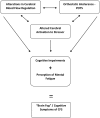Caught in the thickness of brain fog: exploring the cognitive symptoms of Chronic Fatigue Syndrome
- PMID: 23576989
- PMCID: PMC3617392
- DOI: 10.3389/fphys.2013.00063
Caught in the thickness of brain fog: exploring the cognitive symptoms of Chronic Fatigue Syndrome
Abstract
Chronic Fatigue Syndrome (CFS) is defined as greater than 6 months of persistent fatigue that is experienced physically and cognitively. The cognitive symptoms are generally thought to be a mild cognitive impairment, but individuals with CFS subjectively describe them as "brain fog." The impairment is not fully understood and often is described as slow thinking, difficulty focusing, confusion, lack of concentration, forgetfulness, or a haziness in thought processes. Causes of "brain fog" and mild cognitive impairment have been investigated. Possible physiological correlates may be due to the effects of chronic orthostatic intolerance (OI) in the form of the Postural Tachycardia Syndrome (POTS) and decreases in cerebral blood flow (CBF). In addition, fMRI studies suggest that individuals with CFS may require increased cortical and subcortical brain activation to complete difficult mental tasks. Furthermore, neurocognitive testing in CFS has demonstrated deficits in speed and efficiency of information processing, attention, concentration, and working memory. The cognitive impairments are then perceived as an exaggerated mental fatigue. As a whole, this is experienced by those with CFS as "brain fog" and may be viewed as the interaction of physiological, cognitive, and perceptual factors. Thus, the cognitive symptoms of CFS may be due to altered CBF activation and regulation that are exacerbated by a stressor, such as orthostasis or a difficult mental task, resulting in the decreased ability to readily process information, which is then perceived as fatiguing and experienced as "brain fog." Future research looks to further explore these interactions, how they produce cognitive impairments, and explain the perception of "brain fog" from a mechanistic standpoint.
Keywords: Chronic Fatigue Syndrome; brain fog; cerebral blood flow (CBF); functional magnetic resonance imaging (fMRI); neurocognition; orthostatic intolerance; postural orthostatic tachycardia syndrome.
Figures
References
-
- Baddeley A. (1986). Working Memory. New York, NY: Oxford University Press
LinkOut - more resources
Full Text Sources
Other Literature Sources
Research Materials


